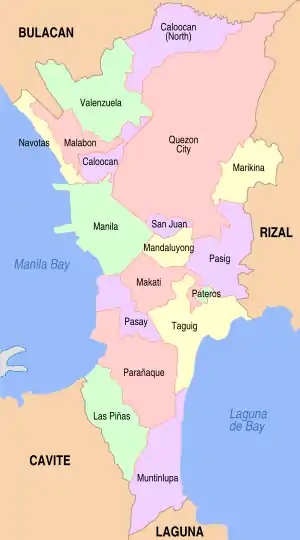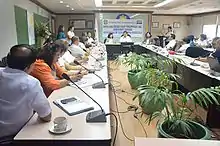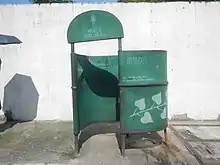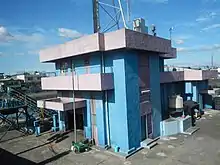Metropolitan Manila Development Authority
The Metropolitan Manila Development Authority (Filipino: Pangasiwaan sa Pagpapaunlad ng Kalakhang Maynila, MMDA), is an agency of the Republic of the Philippines created embracing the cities of Manila, Quezon City, Caloocan, Pasay, Mandaluyong, Makati, Pasig, Marikina, Muntinlupa, Las Piñas, Parañaque, Valenzuela, Malabon, Taguig, Navotas and San Juan and the municipality of Pateros. Metropolitan Manila, or the National Capital Region, is constituted into a special development and administrative region subject to direct supervision of the Office of the President of the Philippines. The MMDA office is located at Epifanio de los Santos Avenue (EDSA) corner Orense Street, Guadalupe, Makati, Philippines.
| Metropolitan Manila Development Authority | |
|---|---|
_2020.svg.png.webp) | |
| Abbreviation | MMDA |
| Agency overview | |
| Formed | 7 November, 1975 |
| Annual budget | ₱4.78 billion (2020)[1] |
| Jurisdictional structure | |
| Operations jurisdiction | Philippines |
| Legal jurisdiction | Metro Manila |
| Specialist jurisdiction |
|
| Operational structure | |
| Headquarters | EDSA cor. Orense St., Guadalupe Nuevo, Makati |
| Traffic enforcers | 2,158 (March 2018)[2] |
| Agency executives |
|
| Parent agency | Office of the President of the Philippines |
| Website | |
| www | |

The MMDA performs planning, monitoring and coordinative functions, and in the process exercises regulatory and supervisory authority over the delivery of metro-wide services within Metro Manila without diminution of the autonomy of the local government units concerning purely local matters.
The agency is headed by a Chairman, who is appointed by, and continues to hold office at the discretion of, the President. The Chairman is vested with the rank, rights, privileges, disqualifications, and prohibitions of a cabinet member.
History
President Ferdinand Marcos issued Presidential Decree 824 creating Metro Manila and its managing public corporation, the Metropolitan Manila Commission (MMC) on November 7, 1975 after the residents of the affected cities and municipalities approved the creation of Metro Manila in a referendum held on February 27, 1975. The moved consolidated the Philippine capital Manila and adjacent Quezon City with 2 cities and 12 municipalities of the province of Rizal and 1 municipality of the province of Bulacan into Metro Manila.[3] Marcos appointed his wife, First Lady Imelda Marcos, as Governor and Ismael Mathay, Jr. as Vice-Governor. The office was located in front of the present-day GMA Network at EDSA corner Timog Avenue, Diliman, Quezon City. November 7, thus, is marked as the anniversary of both the region and the government body that supervises it, the MMDA.
The MMC became effectively defunct when on January 9, 1990, President Corazon Aquino issued Executive Order No. 392, in accordance to Article 18, Section 8 of the 1987 Philippine Constitution which replaced the commission with the Metropolitan Manila Authority (MMA).[4] The Metro Manila mayors will choose from themselves as chairman. Jejomar Binay of the municipality of Makati served as its first chairman. The agency transferred to its present office at Guadalupe, Makati. Binay was followed by Ignacio Bunye of municipality of Muntinlupa in 1991, Ismael Mathay, Jr. of Quezon City in 1992 then Prospero Oreta of the municipality of Malabon in 1994.
Since the elected chairman is one of the mayors of Metro Manila, the role to his constituency gave less attention. Thus, the Congress of the Philippines, composed of the Senate and the House of Representatives, passed Republic Act No. 7924 creating the Metropolitan Manila Development Authority (MMDA) on March 1, 1995. President Fidel V. Ramos appointed Prospero Oreta, who did not run in the Malabon municipal election, as the first Chairman of the MMDA in May 1995 and made him independent of the Metro Manila mayors.
In August 2017, the MMDA has adopted the use of a black beret in order to improve its public image.[5] The berets are used by the traffic enforcers under the agency, which alternate these with a black baseball cap.
Administration
.jpg.webp)
Metro Manila Council

The governing board and policy making body of the MMDA is the Metro Manila Council, composed of the mayors of the cities and municipalities.
The heads of the Department of Transportation (DOTr), Department of Public Works and Highways (DPWH), Department of Tourism (DOT), Department of Budget and Management (DBM), Housing and Urban Development Coordinating Committee (HUDCC), and Philippine National Police (PNP) or their duty authorized representatives, attend meetings of the council as non-voting members.
The council is the policy-making body of the MMDA.
- It approves metro-wide plans, programs and projects and issues rules, regulations and resolutions deemed necessary by the MMDA.
- It may increase the rate of the allowances and per diems of the members of the council to be effective during the term of the succeeding Council. It fixes the compensation of the officers and personnel of the MMDA, and approves the annual budget thereof for submission to the Department of Budget and Management (DBM).
- It promulgates rules and regulations and sets policies and standards for metro-wide application governing the delivery of basic services, prescribes and collects service and regulatory fees, and imposes and collects fines and penalties.
Agency chairpersons
Current Metro Manila Council members
| MMDA Chairman (Presiding officer) | |
|---|---|
| Benjamin Abalos Jr. | |
| Mayors | |
| Mayor | Locality |
| Oscar Malapitan | Caloocan |
| Imelda Aguilar | Las Piñas |
| Abigail Binay | Makati |
| Antolin Oreta | Malabon |
| Carmelita Abalos | Mandaluyong |
| Isko Moreno | Manila (proper) |
| Marcelino Teodoro | Marikina |
| Jaime Fresnedi | Muntinlupa |
| Toby Tiangco | Navotas |
| Edwin Olivarez | Parañaque |
| Imelda Calixto-Rubiano | Pasay |
| Vico Sotto | Pasig |
| Ike Ponce | Pateros |
| Joy Belmonte | Quezon City |
| Francis Zamora | San Juan |
| Lino Cayetano | Taguig |
| Rex Gatchalian | Valenzuela |
The council consists of voting and non-voting members. Voting members are the mayors of the localities in Metro Manila, as well as the Presidents of the Metro Manila Vice Mayors League and the Metro Manila Councilors League. Non-voting members are representatives by the Department of Budget and Management, Department of Tourism, Department of Transportation, Department of Public Works and Highways, Housing Urban and Development Coordinating Council, and the Philippine National Police.[6]
Transport and traffic management
MMDA Media Stations
MMDA had TV and radio stations sometimes carrying the same brand, MMDA Teleradyo. They ceased on August 17, 2010.
- MMDA Traffic Radio 1206 - Traffic updates can be heard on this station. It was started as a test broadcast on September 24, 2007.
- MMDA TV - Traffic updates are Live Feed by Monitoring Cameras Along the streets of Metro Manila with simulcast over MMDA Traffic Radio 1206. It was started as a test broadcast on August 20, 2008.
To compensate for the closure of these communication mediums, the MMDA turned to social media such as Twitter to broadcast traffic updates to users following them. Live billboards, particularly at EDSA, have been also constructed. The MMDA app for iOS and Android have also been made available for free, broadcasting traffic updates directly.
Pasig River Ferry
Since 2014, the agency took over the mothballed Pasig River ferry system in anticipation of huge traffic along the metropolis, from the Skyway Stage 3 construction. In reviving the defunct transportation, many of the old ferry stations were reactivated and new vessels purchased. Ridership of the waterway service increased over time, with the offering of discounts to students and senior citizens. The MMDA intends to continue operating the ferry service until a private investor takes over.
Mabuhay Lanes
Coined by Francis Tolentino, Mabuhay Lanes (formerly called Christmas Lanes, as it was launched during Christmas season of 2014) are roads marked as priority alternative routes that must be cleared of obstruction at all times. This was underscored by strict parking restrictions, where parked vehicles along roads designated as such were towed right away.
Illegal Parking and Towing
The MMDA is tasked to clear obstructions from the roads at all times, and conducts daily clearing operations against stalled and illegally parked vehicles, with subcontracted towing companies. Illegally parked vehicles will be given 5 minutes to leave, and will be towed otherwise. Incapacitated vehicles are almost immediately towed to clear traffic.
Primary and secondary roads, unless with designated parking areas, are considered "No-Parking-Zones".
Footbridges

Starting from Bayani Fernando's term, there has been a large increase in construction of footbridges all over Metro Manila. It has been continued, albeit fewer than before, by succeeding chairmen. It has been hailed due to providing safe passage and crossing for pedestrians in otherwise risky pedestrian lanes.
U-Turn Slots
While already in existence long ago and is not a new concept, it was made popular by Bayani Fernando as a solution to worsening traffic in Metro Manila by closing certain intersections and create U-Turn slots meters away from the former intersection to create continuous traffic, mitigating bottlenecks caused by traffic light signals. This produced mixed results as there were improvements and deterioration in certain areas. During Tolentino's and Carlos' term, some intersections reverted to signalized open intersections only to reimplement U-Turn slots later on.
Public Urinals
A short-lived curiosity all around Metro Manila is the pink urinals made popular by Bayani Fernando, which he implemented prominently in Marikina in an effort to curb public urination. They have since been removed, however, with remaining urinal units distributed instead to local government units.
Flood control and sewerage management

Pumping Stations
The MMDA operates several pumping stations in strategic areas of Metro Manila, with the aim of mitigating flooding risks, particularly during inclement weather. Old pumping stations that used diesel engines were upgraded in 2015 to use electric motors. Brand new pumping stations were also constructed in flood-prone areas as part of the agency's flood-mitigation program. In addition they also scheduled a regular maintenance of 54 pumping stations across the country with 12 stations being equipped with new pumps.[7]
Waterway dredging
Starting with Bayani Fernando's tenure, the Estero Blitz (Waterway Blitz) became an annual waterway clearing operation with emphasis on river dredging activities, particularly at flood-prone areas, to reduce the risk and impact of flooding all over the metropolis. The clearing operation is usually conducted during the dry summer season.
Urban renewal, zoning, and land use planning, and shelter services
Gwapotel
The Gwapotel Inn is a cheap hotel run by the Metropolitan Manila Development Authority.[8] A second Gwapotel was announced in December, 2007.[9]
The Gwapotel along Roxas Boulevard is renamed the MMDA Workers Inn, and operated until 2017. It was closed due to deteriorating structure and will be rehabilitated/transferred at an unspecified date. The Abad Santos Gwapotel has since been converted into their training barracks.
Sidewalk Clearing Operations
The MMDA are empowered to conduct sidewalk clearing operations in a bid to ease traffic flow and enforcement of sidewalks for people.
The MMDA's sidewalk clearing operations became notorious during Bayani Fernando's tenure for intense clearing activities that became a subject of complaints. These were reduced during the term of Oscar Innocentes and the earlier part of Francis Tolentino's term, but eventually was continued, with the cooperation of the public in submitted reports from SMS, Facebook and Viber.
Aside from the towing team, the SCOG is a prominent group in the MMDA in various operations conducted by a conglomerate of government agencies focused on roadway and vehicle enforcement, the I-ACT.
Health
Anti-smoking campaign
The Court of Appeals says the MMDA is not among the government agencies deputized to implement RA 9211 or the Tobacco Regulation Act of 2003. The CA added that the MMDA has no police or legislative power to implement the law. It declared invalid MMDA Resolution No. 11-19, which the agency used as basis to implement its anti-smoking campaign.[10]
Public safety
A first metro-wide earthquake drill was conducted on July 30, 2015 to prepare the public in the event of a magnitude 7.2 earthquake. Various government agencies, educational institutions and the private sector participated in the drill spearheaded by the Metropolitan Manila Development Authority (MMDA). Different scenarios were re-enacted to simulate a destructive earthquake that is expected to happen when the 100-kilometer West Valley Fault moves.[11] Buoyed by its success the MMDA has since hosted annual regional drills for the capital.
Criticisms
In the past, such practices were justified by rhetoric that street children need to be 'rescued' from the street. Advocacy groups contend that in seeking to create a beautiful metropolis, the MMDA often treat Metro Manila's urban poor like 'rubbish' on the street.[12]
A report from PREDA that was funded by UNICEF, claims inhumane proceedings to caught vagrants.[13]
See also
Notes
References
- Aika Rey (8 January 2020). "Where will the money go?". Rappler. Retrieved 29 May 2020.
- Ramirez, Robertzon (1 March 2018). "MMDA lacks traffic enforcers". The Philippine Star. Retrieved 10 August 2018.
- "Presidential Decree No. 824, s. 1975 - Creating Metropolitan Manila and the Metropolitan Manila Commission and for other Purposes". Official Gazette of the Republic of the Philippines. 7 November 1975. Retrieved 26 November 2016.
- "Executive Order No. 392, s. 1990 - Constituting the Metropolitan Manila Authority, Providing for its Powers and Functions and for other Purposes". Official Gazette of the Republic of the Philippines. 9 January 1990. Retrieved 26 November 2016.
- "MMDA enforcers get black berets". Retrieved 12 August 2017.
- "METROPOLITAN MANILA DEVELOPMENT AUTHORITY RULES AND REGULATIONS IMPLEMENTING R. A. 7924, THE LAW CREATING THE METROPOLITAN MANILA DEVELOPMENT AUTHORITY". Metropolitan Manila Development Authority. 8 June 1996. Retrieved 5 February 2017.
- "MMDA Gears Up For Upcoming Rainy Season". CarBay Philippines. Retrieved 2016-06-07.
- Inquirer.net, MMDA’s ‘Gwapotel’ a big hit with transients
- manilabulletin.com, Abandoned Tondo hospital to be turned into second ‘Gwapotel’
- "MMDA has 'no power' to enforce anti-smoking campaign". Rappler.
- "IN PHOTOS: 2015 Metro Manila Shake Drill". Inquirer.net.
- http://www.bahaytuluyan.org/news/indiscriminate_rescue_of_street_children_in_the_city_of_manila_28_january_2008.pdf Archived 2010-11-28 at the Wayback Machine Sagip or Huli? The indiscriminant 'rescue' of Manila's street children
- "Archived copy". Archived from the original on 2012-09-09. Retrieved 2010-06-11.CS1 maint: archived copy as title (link)
- "Philippines Government Adopts Manila Transport Plan Based on JICA Study:Plan aims to cut traffic congestion, air pollution and excessive burden on the poor" (Press release). Japan International Cooperation Agency. September 25, 2014. Retrieved October 7, 2014.
